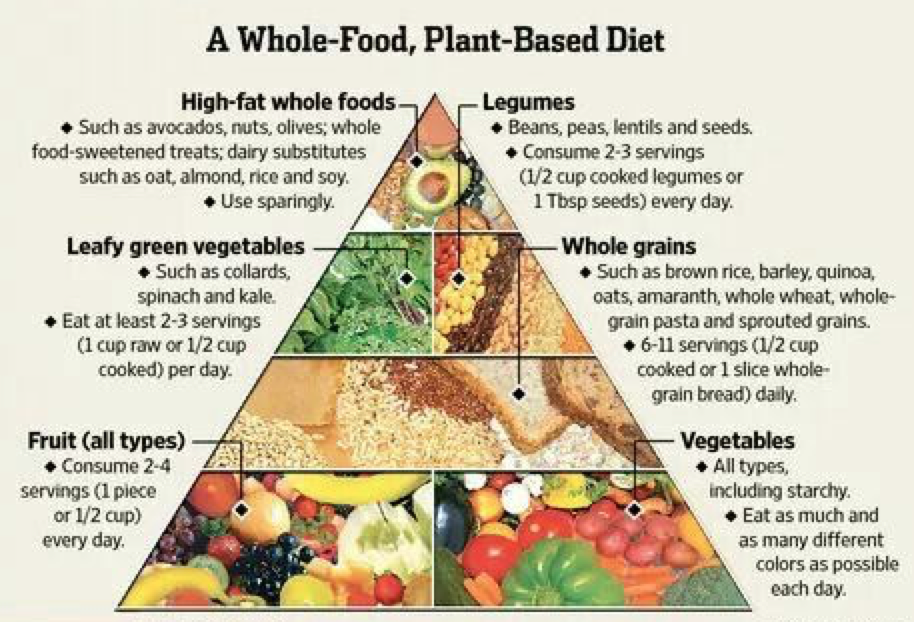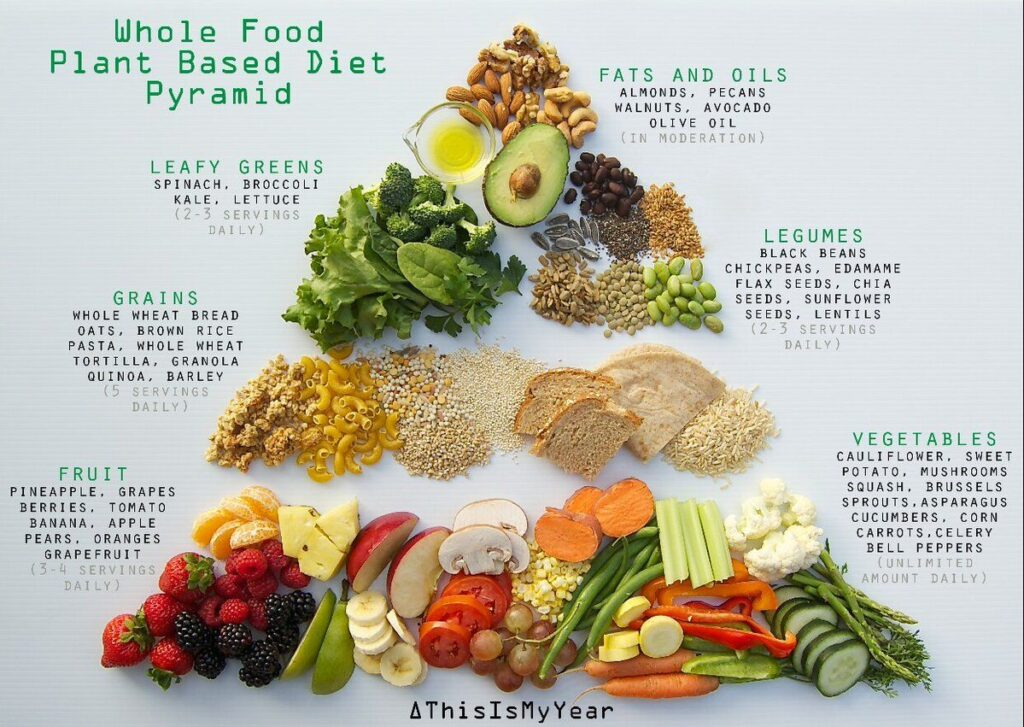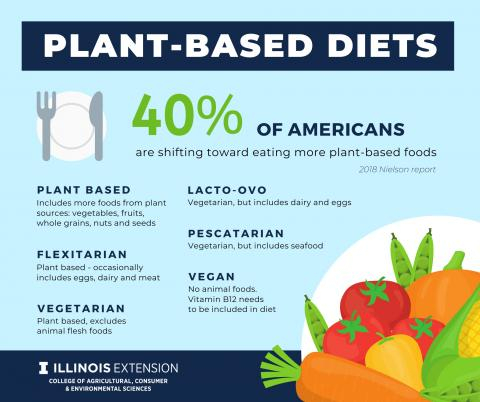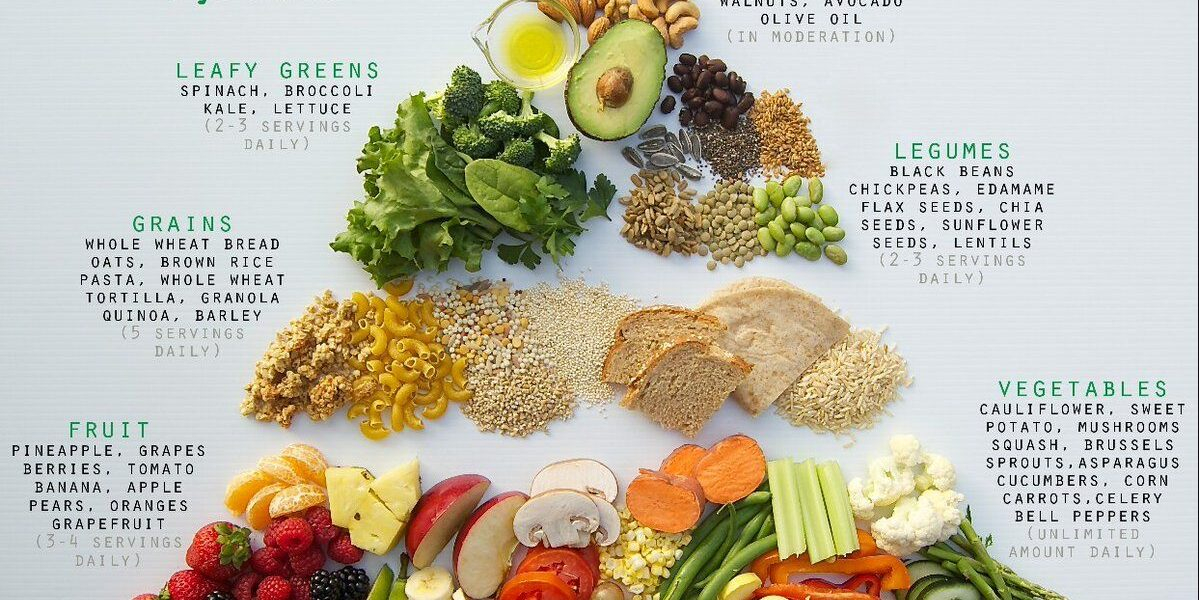Plant-Based Diets: A Nutritional Overview
In this article, you will discover the nutritional benefits of plant-based diets. From the abundance of vitamins and minerals found in fruits and vegetables to the high-quality protein in legumes and grains, plant-based diets offer a wealth of nutrients that can support your overall health and well-being. Whether you are considering a fully plant-based lifestyle or simply looking to incorporate more plant-based meals into your diet, this article will provide you with a comprehensive overview of the nutritional advantages and considerations of plant-based eating. So, let’s explore the world of plant-based diets and see how they can nourish your body and support a healthier you.

The Basics of Plant-Based Diets
Definition of a Plant-Based Diet
A plant-based diet is a dietary approach that prioritizes the consumption of foods derived from plants. This means that the majority of your meals consist of fruits, vegetables, whole grains, legumes, nuts, and seeds. While individual preferences may vary, a plant-based diet typically includes limited or no intake of animal products, such as meat, poultry, fish, dairy, and eggs. However, it’s important to note that there are different variations of plant-based diets, ranging from vegetarianism, which excludes meat but may still include dairy and eggs, to veganism, which eliminates all animal-derived products.
Why Choose a Plant-Based Diet
There are numerous reasons why someone might choose to adopt a plant-based diet. One of the primary reasons is the potential health benefits associated with this dietary pattern. Plant-based diets are naturally high in fiber, which can help with digestion, promote a feeling of fullness, and support a healthy weight. Additionally, plant-based diets are rich in vitamins, minerals, and antioxidants, which play a crucial role in maintaining overall wellness and reducing the risk of chronic diseases.
Ethical and environmental considerations also drive many individuals to embrace plant-based diets. By reducing or eliminating the consumption of animal products, people can minimize their contribution to animal suffering and reduce their environmental footprint. Plant-based diets are generally more sustainable and require fewer resources, such as land, water, and energy, compared to conventional animal-based diets.
Types of Plant-Based Diets
When it comes to plant-based diets, there is no one-size-fits-all approach. Several variations exist to accommodate individual preferences and dietary needs. Here are some common types of plant-based diets:
-
Vegetarian: A vegetarian diet excludes meat, but may still include dairy, eggs, and other animal-derived products.
-
Vegan: A vegan diet strictly avoids all animal products, including meat, fish, poultry, dairy, eggs, honey, and gelatin.
-
Whole Food Plant-Based: A whole food plant-based diet emphasizes wholesome, minimally processed plant foods. It limits or excludes refined products like white flour, sugar, and oils.
-
Flexitarian: A flexitarian diet primarily focuses on plant foods but allows occasional consumption of animal products in moderation.
It’s important to choose a plant-based diet that suits your lifestyle, dietary preferences, and nutritional needs.
Nutritional Benefits of Plant-Based Diets
High in Fiber
One of the key nutritional benefits of plant-based diets is their high fiber content. Fiber is a type of carbohydrate that the body cannot digest, but it plays a crucial role in supporting digestive health. Plant foods, such as fruits, vegetables, whole grains, legumes, nuts, and seeds, are rich sources of dietary fiber. By including these foods in your diet, you can promote regular bowel movements, prevent constipation, and maintain a healthy gut microbiome. Additionally, consuming fiber-rich foods can help regulate blood sugar levels, lower cholesterol levels, and contribute to weight management.
Rich in Vitamins and Minerals
Plant-based diets are naturally abundant in a wide variety of vitamins and minerals. Fruits and vegetables, in particular, are packed with antioxidants, vitamins, and minerals that are essential for optimal health. Vitamin C, found in citrus fruits and leafy greens, strengthens the immune system and supports collagen production. Leafy green vegetables, such as spinach and kale, are excellent sources of vitamin K, which is important for bone health and blood clotting. Meanwhile, legumes like lentils and chickpeas are rich in iron, which is crucial for oxygen transport and energy production in the body. By incorporating a diverse range of plant foods into your diet, you can ensure you’re getting a wide spectrum of essential nutrients.
Reduced Risk of Chronic Diseases
Adopting a plant-based diet has been linked to a reduced risk of developing chronic diseases such as heart disease, type 2 diabetes, and certain types of cancer. Plant-based diets tend to be lower in saturated fats and cholesterol, which are commonly found in animal products. By reducing the consumption of these harmful substances, individuals may experience improvements in cardiovascular health and a lower risk of heart disease. Additionally, the high fiber and antioxidant content of plant-based diets can help regulate blood sugar levels and improve insulin sensitivity, reducing the risk of developing type 2 diabetes. Finally, phytochemicals found in plant foods have been shown to have protective effects against various types of cancer, making plant-based diets a valuable tool in cancer prevention.

Protein in Plant-Based Diets
Complete vs. Incomplete Proteins
Protein plays a crucial role in building and repairing tissues, supporting immune function, and regulating various body processes. While animal products are often associated with high-quality protein, it is entirely possible to obtain an adequate amount of protein on a plant-based diet. It’s important to understand the concept of complete and incomplete proteins. Complete proteins contain all essential amino acids, which are the building blocks of protein. Animal-derived foods, such as meat, poultry, fish, eggs, and dairy, are complete protein sources. In contrast, plant-based foods are typically considered incomplete protein sources because they do not contain all essential amino acids. However, by combining different plant foods, such as legumes and grains, you can create a complete protein meal.
Sources of Plant-Based Protein
Plant-based protein can be obtained from a variety of sources. Legumes, including beans, lentils, and chickpeas, are excellent sources of protein. They are also rich in fiber and other important nutrients. Soy products, such as tofu, tempeh, and edamame, are another wonderful source of plant-based protein. Nuts and seeds provide both protein and healthy fats. Quinoa is a unique plant food that is considered a complete protein, as it contains all the essential amino acids. Additionally, whole grains like brown rice, oats, and barley contain protein but in slightly smaller amounts. By incorporating a diverse range of these protein-rich plant foods into your diet, you can ensure that you are meeting your protein needs.
Meeting Protein Needs on a Plant-Based Diet
In order to meet your protein needs on a plant-based diet, it’s important to aim for variety and adequacy. By consuming a wide range of plant-based protein sources, you can ensure that you are obtaining all the essential amino acids. Additionally, consider incorporating complementary proteins into your meals. Combining legumes with grains, such as rice and beans, or nuts and seeds with whole grains, can create a complete protein profile. It’s also important to pay attention to portion sizes and eat enough calories to support your activity levels and maintain overall health. By following these guidelines, you can easily meet your protein requirements on a plant-based diet.
Carbohydrates in Plant-Based Diets
Importance of Carbohydrates
Carbohydrates are one of the body’s primary sources of energy. They provide fuel for physical activity, brain function, and other bodily processes. Carbohydrates are especially important for individuals who engage in regular exercise or have high energy demands. While low-carbohydrate diets have gained popularity in recent years, it’s crucial to include an adequate amount of carbohydrates in your diet, especially on a plant-based diet. Carbohydrates, particularly those from whole plant foods, provide essential nutrients, fiber, and antioxidants that are important for overall health.
Types of Carbohydrates
Carbohydrates can be categorized into two main types: simple and complex carbohydrates. Simple carbohydrates include sugars found naturally in fruits and vegetables, as well as added sugars found in processed foods, sweets, and beverages. While simple carbohydrates can provide quick energy, it’s important to limit added sugars as they offer little nutritional value. Complex carbohydrates, on the other hand, are found in whole plant foods, such as whole grains, legumes, and starchy vegetables. These types of carbohydrates are rich in fiber, vitamins, minerals, and other beneficial compounds that support optimal health.
Choosing the Right Carbohydrates
When following a plant-based diet, it’s important to choose the right carbohydrates for optimal health. Whole grains, such as brown rice, quinoa, whole wheat bread, and oats, are excellent choices as they retain their fiber-rich bran and germ. Legumes like lentils, beans, and peas are another fantastic source of complex carbohydrates, as well as protein and fiber. Including a variety of fruits and vegetables in your diet ensures that you get a wide spectrum of vitamins, minerals, and antioxidants. While it’s okay to enjoy treats and sweets occasionally, it’s important to limit the consumption of refined grains, sugary beverages, and desserts that are high in added sugars. By making smart carbohydrate choices and prioritizing whole plant foods, you can fuel your body and support your overall well-being.

Fats in Plant-Based Diets
Healthy Fats vs. Unhealthy Fats
Fat is an essential macronutrient that provides energy, supports hormone production, cushions organs, and aids in the absorption of fat-soluble vitamins. However, not all fats are created equal. Plant-based diets can include both healthy fats and unhealthy fats. Healthy fats, such as monounsaturated fats and polyunsaturated fats, have been associated with numerous health benefits, including heart health and reducing inflammation. These fats are found in foods like avocados, nuts, seeds, and olive oil. Unhealthy fats, such as saturated fats and trans fats, can raise cholesterol levels and increase the risk of heart disease. They are commonly found in animal products, as well as processed foods like fried snacks, pastries, and margarine.
Sources of Healthy Fats
Plant-based diets offer a plethora of sources for healthy fats. Avocados are a delicious and versatile food that provides healthy monounsaturated fats. Nuts and seeds, such as almonds, walnuts, flaxseeds, and chia seeds, are rich sources of both healthy fats and plant-based protein. Extra virgin olive oil, when used in moderation, can add flavor and healthy fats to your meals. Coconut oil, while high in saturated fat, can be enjoyed in moderation as it contains medium-chain triglycerides that are believed to provide certain health benefits. It’s important to prioritize these healthy fat sources in your plant-based diet and limit the intake of unhealthy fats.
Balancing Fat Intake on a Plant-Based Diet
When it comes to fat intake on a plant-based diet, balance is key. While healthy fats are beneficial, it’s important not to overconsume them, as they are calorie-dense. Fat intake should make up around 20-30% of your daily caloric intake. In addition to incorporating plant-based sources of healthy fats, it’s important to focus on the overall quality and variety of your diet. Aim for a diverse range of whole plant foods to ensure you are getting a wide array of nutrients. Be mindful of portion sizes and consider the cooking methods you use. Baking, grilling, and steaming are healthier options that can help minimize unnecessary fat intake. By finding the right balance and making smart choices, you can enjoy the benefits of healthy fats on a plant-based diet.
Vitamins and Minerals in Plant-Based Diets
Specific Micronutrients to Consider
When following a plant-based diet, there are specific vitamins and minerals that you need to pay attention to. While a well-planned plant-based diet can provide most nutrients, some may require extra attention or supplementation. These include vitamin B12, vitamin D, iodine, calcium, iron, zinc, and omega-3 fatty acids. Plant-based sources of these nutrients can be limited, and some may require additional considerations to meet the recommended intake. It’s important to be aware of these specific nutrients and take the necessary steps to ensure you’re meeting your requirements through either dietary sources or supplementation if needed.
Plant-Based Sources of Essential Vitamins and Minerals
Plant-based diets offer a wide range of sources for essential vitamins and minerals. For vitamin B12, which is primarily found in animal products, fortified plant-based foods like plant-based milks, breakfast cereals, and nutritional yeast can be good options. Vitamin D can be obtained naturally through sunlight exposure, but fortified plant-based milks and cereals can also be sources. Iodine, essential for thyroid health, can be found in seaweed, iodized salt, and some plant-based multivitamins. Calcium can be obtained from plant-based sources such as dark leafy greens, calcium-fortified plant-based milks, tofu, and calcium-set soy products. Iron, which may require extra attention on plant-based diets, can be found in legumes, tofu, pumpkin seeds, dried fruits, and dark leafy greens. Zinc can be obtained through legumes, whole grains, nuts, and seeds. Omega-3 fatty acids, primarily found in fatty fish, can be sourced from flaxseeds, chia seeds, walnuts, and algae-based supplements.
Supplements for Plant-Based Diets
While a well-planned plant-based diet can provide most nutrients, some individuals may require supplements to meet their nutritional needs. Vitamin B12 is a nutrient of concern for plant-based eaters, as it is primarily found in animal products. Considering a vitamin B12 supplement or consuming foods fortified with B12 can help prevent deficiencies. Vitamin D is another nutrient that can be low in plant-based diets, especially for individuals with limited sun exposure. Checking your vitamin D levels and potentially supplementing if necessary is advisable. Certain individuals may also require an iodine supplement, especially if they do not consume iodized salt or seaweed. It’s important to consult with a healthcare professional or registered dietitian to assess your specific nutritional needs and determine whether any additional supplements are necessary.

Calcium and Bone Health on Plant-Based Diets
Calcium Requirements
Calcium is a vital mineral for maintaining strong bones and teeth, supporting nerve function, and aiding in muscle contractions. It’s important to ensure you are meeting the recommended daily intake of calcium, especially on plant-based diets where traditional dairy products are often eliminated. The National Institutes of Health advises adults aged 19-50 to aim for around 1000 mg of calcium per day, while those above 50 years old should target 1200 mg.
Plant-Based Calcium Sources
Fortunately, plant-based diets offer plenty of options for obtaining calcium. Dark leafy greens, such as kale, collard greens, and bok choy, are excellent sources. Other plant-based sources include calcium-set tofu, soy milk, calcium-fortified plant-based milks, sesame seeds, almonds, and legumes. Certain fruits like oranges and figs also contain small amounts of calcium. It’s important to note that the calcium bioavailability from plant-based sources can vary and may be lower due to factors like oxalates and phytates. However, by consuming a variety of these calcium-rich plant foods throughout the day, you can ensure you’re meeting your calcium needs.
Optimizing Bone Health on a Plant-Based Diet
In addition to calcium intake, there are other factors to consider for optimal bone health on a plant-based diet. Vitamin D plays a crucial role in calcium absorption and bone health. Since vitamin D is found primarily in animal-based foods, individuals on plant-based diets should ensure adequate sun exposure or consider a vitamin D supplement. Regular weight-bearing exercises, such as walking, jogging, or resistance training, can also help maintain bone density. Additionally, avoiding excessive alcohol consumption and refraining from smoking are important for bone health. By combining these strategies, you can optimize bone health while following a plant-based diet.
Iron and Iron Absorption in Plant-Based Diets
Importance of Iron
Iron is an essential mineral that plays a key role in carrying oxygen throughout the body, supporting immune function, and maintaining energy levels. While iron deficiency is a common nutritional concern globally, it’s especially important for individuals following plant-based diets to pay attention to iron intake. Plant-based iron is less bioavailable compared to the iron found in animal products, which means your body may have a harder time absorbing it. Iron deficiency can lead to fatigue, impaired cognitive function, and weakened immune system.
Plant-Based Iron Sources
Plant-based diets offer a variety of iron-rich foods that can help maintain healthy iron levels. Legumes, such as lentils, chickpeas, and black beans, are excellent sources of iron. Dark leafy greens like spinach, kale, and Swiss chard also provide iron. Other iron-rich plant foods include whole grains, seeds like pumpkin and sesame seeds, dried fruits like apricots and raisins, and fortified cereals. It’s important to note that non-heme iron, which is the form found in plant-based foods, is less well-absorbed than heme iron from animal products. However, by combining plant-based iron sources with vitamin C-rich foods, such as citrus fruits or bell peppers, you can increase iron absorption.
Enhancing Iron Absorption
To optimize iron absorption on a plant-based diet, there are strategies you can employ. Consuming vitamin C-rich foods alongside iron-rich plant foods can significantly enhance iron absorption. Including fruits like oranges, strawberries, and kiwis, or vegetables like bell peppers and broccoli, in your meals can help. Additionally, avoiding the consumption of tea and coffee with meals, as their compounds can inhibit iron absorption, can be beneficial. Cooking methods, such as soaking and sprouting legumes, can also enhance iron absorption. Finally, if you are concerned about your iron levels, consider talking to a healthcare professional or registered dietitian to assess your iron status and determine whether an iron supplement is needed.

Omega-3 Fatty Acids in Plant-Based Diets
The Role of Omega-3 Fatty Acids
Omega-3 fatty acids are essential fats that play a crucial role in brain health, reducing inflammation in the body, and supporting heart health. While fatty fish is a well-known source of omega-3s, individuals on plant-based diets can also obtain these beneficial fats from plant sources. However, it’s important to note that plant-based omega-3s are in the form of alpha-linolenic acid (ALA), which the body must convert into the more active forms, eicosapentaenoic acid (EPA) and docosahexaenoic acid (DHA).
Plant-Based Sources of Omega-3s
Plant-based diets can provide adequate amounts of omega-3 fatty acids through certain plant foods. Flaxseeds and flaxseed oil are rich sources of ALA. Chia seeds, hemp seeds, and walnuts also contain omega-3s. Seaweed and algae-based supplements can provide EPA and DHA, although they may not be suitable for everyone. By regularly incorporating these plant-based sources into your diet, you can ensure a sufficient intake of omega-3 fatty acids.
Ensuring Adequate Omega-3 Intake
While plant-based sources of omega-3s are available, some individuals may have trouble converting ALA into EPA and DHA efficiently. Factors such as age, gender, genetics, and overall health can affect this conversion process. For individuals who struggle with conversion, or who want to ensure optimal omega-3 levels, considering an algae-based supplement that provides EPA and DHA can be beneficial. It’s important to consult with a healthcare professional or registered dietitian to assess your unique needs and determine the best approach for meeting your omega-3 requirements.
Conclusion
Plant-based diets offer numerous health benefits and are a sustainable choice for both individual well-being and the environment. By focusing on a diverse array of plant foods and incorporating a variety of nutrients, individuals can thrive and experience the nutritional benefits of this dietary approach. From high fiber content and rich vitamins and minerals to reduced risks of chronic diseases, plant-based diets can support overall health and longevity. With careful planning and attention to specific nutrients, it is entirely possible to meet your nutritional needs on a plant-based diet. Remember to consult with a healthcare professional or registered dietitian to tailor your plant-based diet to your individual needs and ensure you’re getting all the nutrients your body requires. By embracing a plant-based lifestyle, you can prioritize your health and make a positive impact on the world around you.

